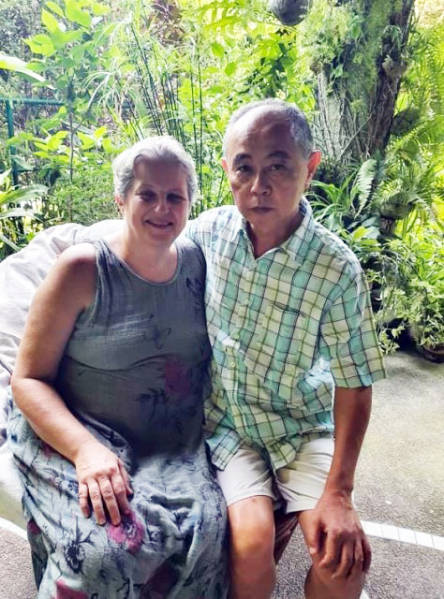国際結婚インタビュー クラウディアさん&正明さん
【マニラで考える異文化コミュニケーション】
毎日が異文化コミュニケーション!? フィリピン在住の国際結婚カップルインタビュー
クラウディア・ ボイクマンさん 英語・ドイツ語講師。ドイツ中西部ノルトライン=ヴェストファーレン州メンヒェングラートバッハ出身。
蝶谷正明さん セブ日本人会理事、日本人補習授業校校長。東京生まれ横浜育ち。著書『古代装飾トイレの謎―仏教と遺跡めぐり 』(TOTO出版)。本誌で「セブ通信」連載中。
「結婚29年目。日本在住の娘(27歳)と英国在住の息子(25歳)がいます。昨年3月、息子が英国に招待してくれるというので夫婦で楽しみにしていたらコロナ禍で延期になりました」
Claudia Beukmann English and German Language Teacher Hometown: Mönchengladbach, Nordrhein-Westfalen, Germany
Masaaki Choya Director, Japanese Association Cebu, Inc., Principal, Cebu Japanese School Hometown : Tokyo and Yokohama, Japan
Masaaki and Claudia have been married for 29 years, residing in Cebu since 2007. They have a daughter living in Japan and a son working in the UK.
Photo Courtesy of Masaaki Choya
出会いは共通の興味。生活は文化の違い満載
Connected by the same interest. Living with Cultural Differences.
―なれそめは?
正明 最初に会ったのは1990年、スリランカ のアヌラーダプラ での遺跡発掘プロジェクト。所属するチームは違いましたが、同じ地域で活動していて知り合いました。当時スリランカは内戦中でした。
―第一印象は?
正明 もの静かだけれども、はっきり主張するという印象でしたね。
クラウディア 話していておもしろく、考古学という共通の興味を持っていると感じました。
―結婚に至る経緯は?
正明 出会った翌年から交際し、私はスリランカ、彼女がドイツでアエログラム(航空書簡)をやり取りしての遠距離恋愛。その後、彼女が再びスリランカへ来て一緒に暮らしている時、彼女が飼っていたシマリスが死んでしまい・・・・・・。嘆き悲しむ彼女を慰めている時にプロポーズしました 。スリランカから国際電話で双方の親とスリランカ在住の友人に報告し、披露宴に来て祝福してくれました。
クラウディア 交際していたのは1年ですが、ほとんど離れ離れだったので一緒にいたのは実質約6週間。結婚相手にふさわしい人だと思いました。
―フィリピンを選んだ理由は?
正明 私の親がいる群馬県富岡市に夫婦で12年住んでいた時、彼女と私は海外移住を考えていました。フィリピンはやめようと思っていたのですが、子どもが世界共通の大学入学資格プログラム「国際バカロレア」(IB)が取得できるインターナショナルスクールがセブにあり、日本やほかのアジア諸国より学費が安かった。そこで私がセブを視察した後、2007年に移住しました。当時小学生の娘と息子は大反対でした。
セブに移住後、娘は高校から日本へ戻り、大学、就職、結婚も日本。息子はIBを取得しましたが料理の道へ進むと言い出し、妻の「それならば大学へ行くより現場で経験を積むべき」という鶴の一声で、ドイツのホテルに就職しました。今は英国のミシュラン星付きのレストランで副料理長をしています。
―家庭での言語は?
正明 妻とは英語で、子どもとは日本語で会話します。
クラウディア 夫は英語、娘は英語と日本語、息子は英語、ドイツ語を話します。
―カルチャーショックの経験は?
正明 妻の子どものしつけ、特にマナーに厳しいこと。例えば食事の時に背筋を丸めていると激しく叱責しました。今だったら幼児虐待だと思われるかもしれません。日本在住時は、日本的な感覚とのギャップに当惑しました。また、はっきりと自己主張することにも文化の違いを感じました。何か飲みたい時は①具体的に何を飲みたいのか?②誰が用意するのか?③急ぐのか急がないのか?といった具合です。
クラウディア 日本人の感覚では、相手の思っていることを察しますが、コミュニケ―ションが足りないと感じました。また、西洋ではお互いに触れ合うことが好まれますが、日本ではスキンシップが足りない。
正明 日本人はハグなどのスキンシップは慣れないので、最初の1、2年であきらめてくれたようです。
Where did you come to know each other?
Masaaki: We met each other in Anuradhapura, Sri Lanka in 1990, where we were involved in a ruins excavation project. We belonged to a different team but worked at the same site. It was in the middle of the Sri Lankan Civil War.
What was your first impression of your partner?
Masaaki : She was quiet but spoke up when necessary.
Claudia: He was interesting to talk to and it looked as if we had the same interests in archaeology.
How did you decide to get married?
Masaaki : We were in a long-distance relationship between Germany and Sri Lanka. We exchanged aerograms. After she was back to Sri Lanka, we lived together. When she grieved the loss of her pet squirrel, I comforted her and proposed to her. We called our parents and friends to inform our marriage and they came to Sri Lanka to attend our wedding reception.
Claudia: Technically for a year we were in a relationship before marriage, but we were apart most of that time. Actually it was about six weeks that we were together. I knew that he was the right one.
Why did you decide to settle in the Philippines?
Masaaki : We used to live in Gumma, Japan for 12 years and wanted to emigrate overseas. Honestly, we did not think about the Philippines as a destination. But we chose Cebu because we wanted to our children to study at the Cebu International School offering International Baccalaureate,a.k.a.IB, programs for reasonable tuition fees. Our children who were at a primary school then and protested against our migration from Japan. My daughter went back to Japan to go on to high school and college and got married in Japan. My son got an IB but decided to be a chef instead of going to college. As my wife advised, he got a job at a hotel in Germany and now he is a sous chef at a Michelin-starred restaurant in the UK.
What is your language of communication at home?
Masaaki : I speak English when talking to my wife, and Japanese to children.
Claudia: Husband: English, Daughter : English/Japanese, Son: English/German
Did you have any culture shocks?
Masaaki : I was surprised to see how strict she disciplined children, especially training them in good manners. She scolded at them loudly when they had bad posture when dining. I also felt a cultural difference when seeing she was assertive unlike Japanese. For example, when she wants something to drink, she says clearly what to drink, who serves it, Whether it’s in a harry or not.
Claudia: The lack of communication, when it comes to feelings on the Japanese side. Japanese always seem to think one already knows or can read their emotions, and also the lack of touch. Most Westerners love to touch each other. It is still a work in progress….
Masaaki : I was not used to hugging and being touched…..she gave up lacking in touch.



